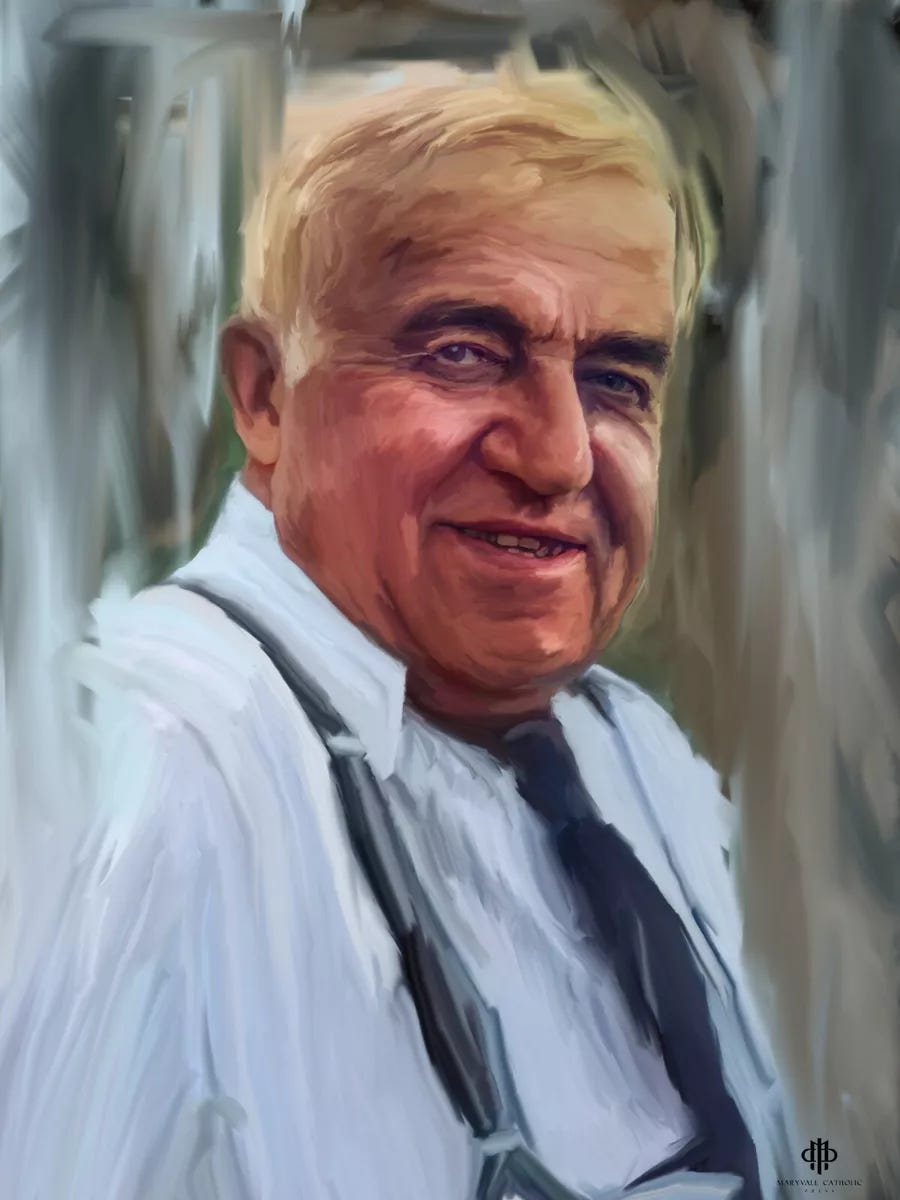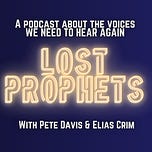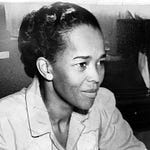
If Dorothy Day is better known today than her close colleague, Peter Maurin, it is not for lack of praise from Dorothy herself. She never ceased to emphasize Peter’s influence and his role, noting that there would not have been a Catholic Worker movement but for Peter. “Peter gave me more than instruction”, she liked to repeat. “He gave me a way of life.”
That way of life, a radical path of voluntary poverty and service to the poor, grew out of Peter’s early life, having been born into a large French family which farmed the same land in the Languedoc region for centuries. His peripatetic life experiences doing all kinds of day labor to support himself as an independent intellectual and Catholic street preacher served to keep him close to the poor. “He believed in poverty,” Dorothy once noted, “and loved it and felt it as a liberating force.”
Despite his Chaplinesque, shabby appearance, Maurin’s mental universe was immensely rich, stocked with a mix of Catholic theology, history, and literature which he happily shared with any and all he encountered. He opposed both communism and industrial capitalism, favoring his own notion of a “green revolution” in a three-point program of roundtable discussions, houses of hospitality, and farming communes that blended religion, politics, and ecology — or, as he put it, “cult, culture, and cultivation.” These ideas became the program of the Catholic Worker movement during Peter’s lifetime.
Our guest for this episode is Kelly Johnson, associate professor of religious studies at the University of Dayton and author of The Fear of Beggars: Stewardship and Poverty in Christian Ethics (2007).
Some takeaways from our conversation:
Peter as a paragon of a radical, Franciscan Christianity in which piety and social justice are fused in a gentle personalism.
Peter’s life as the outsider, the pilgrim, the mendicant beggar at times. By 1934, he had given up everything—home, status, financial security and his personal life to become “a fool for Christ” (cf. I Corinthians 1:10).
Peter’s “troubadour method” of reciting his Easy Essays on street corners to crowds. Once asked what university he had graduated from, he answered, “Union Square.”
Peter taught Dorothy his philosophies of distributism and anarchy, as well as his opposition to usury—a shared goal of a society in which “it would be easier for people to be good.”
Peter’s opposition to the New Deal and to the wage-only focus of unions, as neither solution goes to the roots. Only the land movement, he felt, was a cure for unemployment.
Peter’s vision of “cells of good living” over trying to seize power at the top.
Peter’s love of language and word-play: “The aim of the Catholic Worker is to make an impression on the Depression through expression.”
Peter’s contrast between machine civilization and handicraft civilization (agriculture and crafts). His idea that scholars must become farmers and farmers must become scholars, part of his vision of restoring a truly Catholic culture—reclaiming the dignity of manual labor.
In the 1940s, Peter defended the Jewish people from slanders and appealed for the U.S. to accept more refugees.
Peter was one of the first Catholics to seriously entertain dialogue with Marxists.
Peter and the Catholic Worker movement influenced Michael Harrington, Thomas Merton, Daniel Berrigan, and E.F. Schumacher, among many others.
Timestamps
Introduction to Peter Maurin and the Catholic Worker Movement, brief overview of Peter's background and significance. [00:00:00]
Peter's early life in France, his upbringing and family background. [00:05:29]
Peter’s travels and experiences in North America, journey through Canada and the United States, various jobs and encounters. [00:08:00]
Peter’s "Easy Essays." Discussion of his unique writing style and method of communicating ideas. [00:13:00]
Peter’s personalist philosophy, and an exploration of his views on the centrality of the human person and its relation to community. [00:20:02]
The Green Revolution and Peter’s agrarian vision, a precursor of our notions of sustainability. [00:25:30]
Peter's critique of industrial capitalism and alternative economic ideas. Discussion of distributism, cooperatives, and his vision for a new social order. [00:35:00]
Peter’s approach to popular education through the practice of "roundtable discussions" about social issues and solutions, as well as Peter’s ideas about integrating manual labor, intellectual pursuits, and social action. [00:45:00]
Interview with Kelly Johnson (University of Dayton), and her first encounter with Peter Maurin. [00:58:42]
Peter’s practice of voluntary poverty — his way of embodying his own ideas, not merely talking about them. Plus, an introduction to “viator economics.” [01:10:00]
The historic partnership between Peter and Dorothy Day. Analysis of their complementary roles in founding the Catholic Worker Movement. [01:20:08]
Peter's way of empowering those with whom he spoke—a sign of a great teacher. His notable blind spot: the impact of slavery. This missed moment for lay Catholic theology—not informing the life of the Church? Hope as a thing you do, not a thing you feel. [01:30:00]
Concluding thoughts and reflections from the hosts — and a mention of possible topics for some future episodes. [01:43:29]
Recommended:
The Forgotten Radical Peter Maurin: Easy Essays from the Catholic Worker, edited by Lincoln Rice (2020)
Peter Maurin: Apostle to the World, Dorothy Day with Francis J. Sicius (2004)
The Long Loneliness: The Autobiography of the Legendary Catholic Social Activist, Dorothy Day (1952, 2009)
Peter Maurin: Prophet in the Twentieth Century, Marc H. Ellis (2010)
The Fear of Beggars: Stewardship and Poverty in Christian Ethics, Kelly Johnson (2007).
Many thanks to the great band NOBLE DUST, who provides the music for Lost Prophets. Their latest album A Picture for a Frame is here.
This is the third episode of LOST PROPHETS, a podcast about the mid-century voices of solidarity we need to hear again. To listen on your podcast player, our Spotify link is here, Apple Podcasts link is here, and RSS link is here.















Share this post